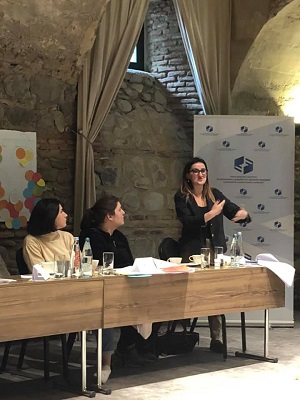UN Women commences training of women in inclusive peace negotiations
Date:
Though it has now been 20 years since the adoption of United Nations Security Council resolution 1325 (2000) on Women, Peace and Security, integrating a gender perspective into peace processes and negotiations still continues to be a challenge.

At the same time, surveys show that women’s participation in peace processes the resulting agreement is 35% more likely to last at least 15 years. Thus, their involvement is crucial in achieving a durable peace. In order to ensure the integration of a gender perspective into inclusive peace processes and negotiations, one of the directions of the activities of UN Women includes raising the awareness on existing gender inequality in peace processes and training women as mediators and negotiators. To this end, UN Women cooperates with the Ministry of Foreign Affairs of Georgia and its affiliated Levan Mikeladze Diplomatic Training and Research Institute. One example of this partnership is the joint three-day pilot training course that was attended by 19 representatives from various government agencies working on peace and conflict issues.
The course addressed how to design an inclusive peace process and negotiations and apply gender lens. Along with these topics, the participants discussed the gender analysis of conflicts and debated as to how to include a gender perspective in the course of official peace negotiations. The pilot training is led by the trainers Ketevan Chumbadze, Deputy Political Director of the Ministry of Foreign Affairs of Georgia, and Nino Berikashvili, Head of Conflict Resolution Policy Division of the same Department.
As mentioned by the training participant Iza Kasrelishvili, given the continuing gender imbalance official negotiations, it is necessary to understand the importance of including a gender perspective in the peace processes. She further noted: “The trainers, who have intensive practical experience in this area, have shared important knowledge on how to lead negotiations on conflict resolution and demonstrated the significance of the effective participation of women in these processes and in decision-making in general.”
It is noteworthy that the Levan Mikeladze Diplomatic Training and Research Institute will offer the training course to the employees of various state agencies working on conflicts and international relations on regular bases.
The training was conducted within the framework of the UN Women project “Strengthening Women’s Meaningful Participation in Peacebuilding and Gender Mainstreaming in the Security Sector in Georgia”, which is supported by the Conflict, Stability and Security Fund of the UK Government.